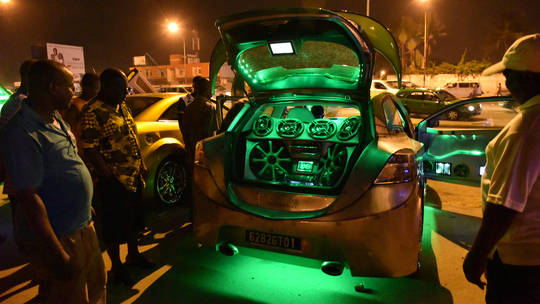..
Egyptian Addict kills entire family using rat poison
over financial hardship
Culprit told police he murdered them because he was unable to support them financially
Published: December 29, 2021 15:48
Tawfiq Nasrallah, Senior News Editor
Dubai: An Egyptian man reportedly killed his wife and three children by mixing rat poison with their their dinner, local media reported.
According to media reports, the culprit, an addict, decided to kill his 54-year-old wife, and sons aged 15, nine, and five because he was unable to support them financially.
I wonder if he could have afforded to feed them if he wasn't feeding his addiction? I get the impression that there are a lot of addicts in Egypt.
The crime came to light when Bani Sweif police received a report from a man claiming that he had found his wife and children dead.
Bani Sweif police launched an immediate investigation into the incident; the autopsy report revealed that the four people died of rat poison.
Upon asking the man about what his family ate the day before their death, he said that they had some stuffed leaves. However, the said he had not had dinner with his family that night, which caused the police to suspect him.
Therefore, police took a sample of the food for lab tests and the results showed that the food was poisoned. Upon being confronted with evidence, the man admitted to killing his entire family because he was unable to support them financially.
In first, Kuwait jails, fires 6 judges for graft
Ruling is linked to a high-profile case of bribery, money laundering
Published: December 29, 2021 15:02
Ramadan Al Sherbini, Correspondent
The Criminal Court sentenced the six judges to imprisonment terms ranging from five to 15 years and ordered their dismissal from jobs and confiscating of cars they had received as bribes in the form of gifts.
Cairo: In an unprecedented ruling in Kuwait, six judges have been handed down to varying jail terms and sacked in connection to a high-profile case of bribery and money laundering involving an Iranian businessman, Kuwaiti media reported.
The Criminal Court sentenced the six judges to imprisonment terms ranging from five to 15 years and ordered their dismissal from jobs and confiscating of cars they had received as bribes in the form of gifts.
The court also acquitted a seventh judge and ordered an eighth to pay a fine of KD5,000 in the same case.
Varying jail terms were also given to employees in the Justice Ministry. The court ordered they must be fired from their jobs on charges of bribery, forgery and money laundering in the same case.
Dubbed in the Kuwaiti media as “the network of Fouad, the Iranian”, the case dates back to July 2020 when Kuwaiti police arrested several people and seized property and large amounts of cash linked to dubious deals.
They were charged with money laundering, dealing in banned alcohol and weaponry possession.
12,000 Afghan refugees stuck in UK hotels – reports
The British government is struggling to find permanent homes for the refugees,
who were evacuated in the summer
Some 12,000 Afghan refugees will start 2022 in a hotel in the UK, despite having arrived months ago during the evacuation of Taliban-ruled Afghanistan, as the British government reportedly struggles to find homes for them.
The Guardian reported on Tuesday that the government was struggling to persuade local councils to find permanent homes for the thousands of Afghan refugees who relocated to Britain following the Taliban’s takeover of Afghanistan. The group launched a military offensive during the summer and took Kabul on August 15.
Sources within the Department for Work and Pensions (DWP) and Home Office told the paper that more than 12,000 Afghan evacuees remained in the so-called ‘bridging accommodation’ as of December 22.
According to the DWP, of the 16,500 people airlifted from Afghanistan to Britain since August, “over 4,000 individuals have either moved into a settled home or are in the process of being moved or matched to a suitable home.”
The government has struggled to find permanent or suitable homes for refugees, meaning they remain in hotel accommodation at the taxpayer’s expense.
According to a Home Office spokesperson, more than 300 local authorities have come forward to offer permanent homes, but the scale of the offering has not met demand.
Officials representing councils in London told the Guardian that many of the hotels being used were unsuitable for long-term stays, especially for children.
Some 7,500 people had been relocated to the UK under the Afghan relocations and assistance policy (ARAP) as of December 7. The plan offered sanctuary and asylum to Afghans who faced danger due to their affiliation with Britain and its two-decade-long operations in Afghanistan.
Around 15,000 people were brought to the UK during Operation Pitting in August. A further 1,500 have been airlifted to Britain in the following months.
Many Afghans have reached British shores by their own means and have claimed asylum.
Russia predicts revival of ISIS & ‘caliphate 2.0’
Moscow says that risks from militant groups worldwide have not gone away
By Layla Guest
Terrorism threats in unstable regions in the Middle East and Afghanistan still remain a key threat to Russia’s safety, Moscow has cautioned, speculating that radicals could be making gains on the African continent.
Speaking to RIA Novosti on Wednesday, Deputy Foreign Minister Oleg Syromolotov said that “the situation for counterterrorism remains very tense. The environment remains difficult in Syria and Iraq, where the main destabilizing factors are the holding of the Idlib de-escalation zone by radical groups and the presence of ISIS and Al-Qaeda cells.”
The official went on to add that “in Africa, especially in the Sahara-Sahel zone, [the Russian Foreign Ministry] can essentially observe the preconditions for… the revival of the terrorist ‘caliphate version 2.0’ there.”
Syromolotov also said that Moscow is “closely monitoring the situation in Afghanistan”, where there is a high level of terrorist threats from the ISIS and Al-Qaeda sympathizers who have settled there after the fall of Kabul to the Taliban this summer. He cautioned that this poses a risk for Russia and Central Asian states.
ISIS, Al-Qaeda, and the Taliban are designated as terrorist organizations and banned in Russia.
The capital of Afghanistan, Kabul, was seized by the insurgent group on August 15 after capturing swathes of the country’s territory. In the wake of the takeover, Moscow positioned itself as a peace broker in Central Asia, hosting a delegation of political representatives from the Taliban.
Following the hasty withdrawal of Western troops from the war-torn country, Russia beefed up its presence in the region, holding joint exercises with former Soviet republics such as Uzbekistan and Tajikistan along the shared frontier.
In July, French President Emmanuel Macron announced that Operation Barkhane, a France-led military campaign against Islamist insurgents in Mali, was set to finish in early 2022. In September, the Malian Prime Minister Choguel Kokalla Maiga said Paris had “abandoned” the African country amid backlash against Bamako’s reported intention to hire up to 1,000 mercenaries from the Russian Wagner Group.
The news that Mali had contacted Russian mercenaries, notorious for their involvement in Syria and Africa, came under fire from several European countries. Foreign Minister Sergey Lavrov revealed to RT’s Caleb Maupin that EU’s top diplomat, Josep Borrell, warned him to stay out of Africa, calling the continent “our place.” The Russian official insisted that it was important for Moscow and Europe to mount an effort to help the Sahel region.
==========================================================================================





































